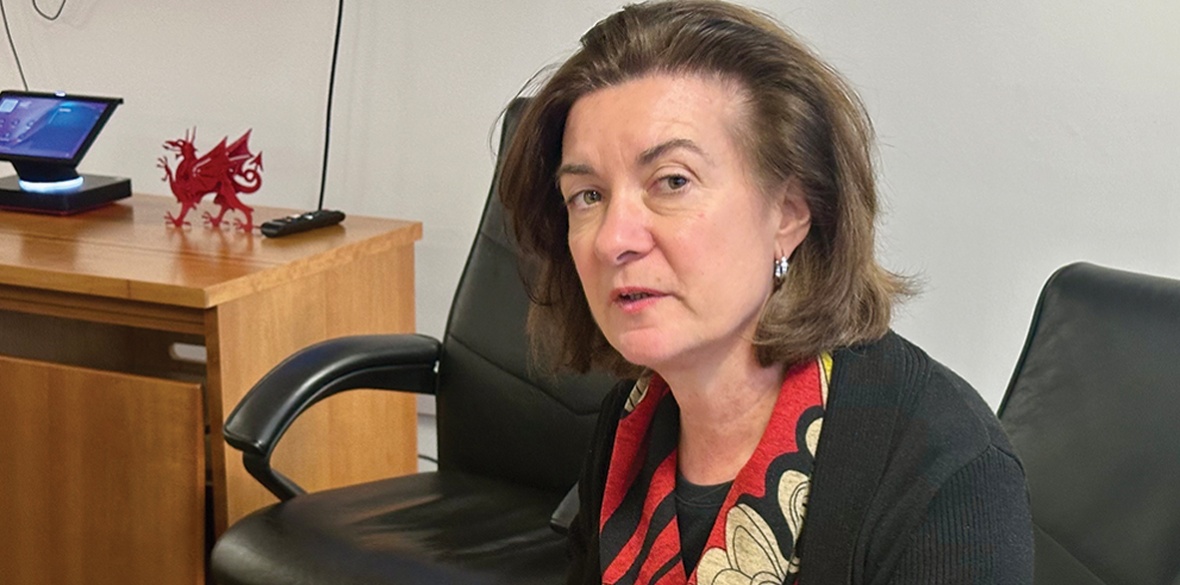This is the last article you can read this month
You can read more article this month
You can read more articles this month
Sorry your limit is up for this month
Reset on:
Please help support the Morning Star by subscribing here
THE Welsh government has just set its Budget for 2025-26, and First Minister Eluned Morgan is bullish that her government has received what she calls the largest Budget increase since devolution in 1997.
We start with a reminder that when Morgan was the health minister, she said it was the toughest job in government, and I said she seemed so much more relaxed as the First Minister.
“It’s good preparation to become First Minister because 50 per cent of the total Budget is spent on health. I am feeling quite comfortable in my position as First Minister because it plays to my strengths.”
Morgan tells me she is a people person and has spent the first few months in post connecting and listening to the people of Wales.
Our conversation was set against the backdrop of Reform UK’s rise in the polls and coming second in 13 seats in Wales at the general election and Nigel Farage’s targeting of the 2026 Senedd election.
With so much of the Welsh public sector cut to the bone after 14 years of austerity and the health service at breaking point, I asked if the Senedd election in 18 months would be enough time to make appreciable differences to people’s lives.
Following her summer “listening tour,” Morgan has decided that her government’s four priorities will be delivering strengthening healthcare services, economic growth and boosting the Welsh economy through investment and job creation, community connectivity with enhanced infrastructure and opportunities for all with equal access to jobs, education and services.
As I prepared for the interview, I watched the First Minister be quizzed by the chairs of the Senedd’s scrutiny committee, where she was telling them her government would be saying no a lot more to their recommendations.
I asked her if it was not dangerous to tell the scrutiny committees that your priorities trump their ideas in their in-depth reports.
“The public told me during the summer what I should focus on, and I’m absolutely focused on that. Every time a committee recommends me to do something else, it takes the focus off the public’s priorities.
“I just wanted to be honest with them, but also, it’s about good government. It’s recognising you’ve only got a limited pot of money and people to do things.
“Every time you ask to do other things, your ability to deliver on the things that are most important are watered down.”
She said that they were happy with the message because they would rather know the Welsh government is not going to do it rather than pretend that it might.
In a move that may anger civil servants and echo Sir Keir Starmer’s attack on the national Civil Service, Morgan also said civil servants will have to change their approach. The FM wants them to deliver rather than keep coming up with strategy plans.
“Civil servants are great at writing strategies, but don’t give me a new strategy until you’ve delivered on the last one.”
We talked about some of the other hurdles that face her government in the short term, such as the ongoing issues with funding related to National Insurance contributions, the two-child benefit cap and the pensioners’ winter fuel allowance.
The FM recognised the challenge posed by right-wing populism, which tapped into public disillusionment.
Morgan explained that to counter this, it was vital to listen to working-class communities and address their needs.
I asked about the importance of being seen to be a Welsh government and not the British government’s representative in Wales. I mentioned Mark Drakeford coining the phrase “clear red water” for then First Minister Rhodri Morgan to show that his government in Wales was radical and different.
Morgan said she was pushing the Prime Minister in every meeting for more funding for Wales, particularly on unresolved issues like the high-speed rail project HS2, which was classified as a Wales-England project despite no physical rail lines in Wales.
“It’s an absolute scandal, and we want our fair share of what we should have got.
“Look, I never go into somewhere spoiling for a fight, but I will make sure that I stand up for my country, and, if necessary, I will stand up and fight.”
I wanted to know how much she was fighting for as the money reportedly owed to Wales from HS2 funding has moved from billions to millions.
“What we’re talking about is getting a fair share of what’s actually being spent.”
The First Minister said the project has been scaled back repeatedly, and her government is looking for its proportionate share of what has actually been spent: the calculation was Wales is owed about £430 million.
This revised figure is substantially less than the £4 billion Labour claimed was owed Wales when the Tories were in power.
Battle lines for the next election are already being fixed around a narrative of change, and we talked about the problems incumbent governments face, especially with populist rightwingers offering simple solutions.
“People are hurt and are really suffering. We’ve got to make sure we’re on the side of working-class voters.
“We need to stand by them and make sure that we produce quality jobs, so that’s why my focus is very much on growing the economy.”
The Morning Star supporters group in Wales is organising an all-Wales conference on February 15 in Cardiff to pull together politicians, trade unions, peace and equality movements and environmental campaigners to develop progressive policies to offer the people of Wales a positive reason to vote. Watch the Star for more details.







